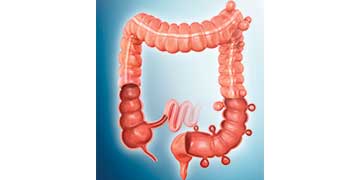US Pharm. 2021;46(12):15-16.

Small Pouches in Digestive Tract
Diverticular disease is a widespread gastrointestinal condition where small pouches form in the lining of the digestive tract. Each one of these pockets or sacs is called a diverticulum. It is present in 70% of people aged 80 years or older, with similar rates for men and women. For some, these sacs can be present in the intestine and not cause any noticeable symptoms. For others, however, the symptoms can be severe, and further dangerous complications can arise. Diverticulosis is the presence of diverticula without associated complications and is the most common finding during a routine colonoscopy. However, when these pouches become inflamed, it is called diverticulitis.
Genetic and Environmental Causes
A diverticulum happens when the inside lining of the intestine pushes through a weak spot in the outer lining, causing a herniation. For many individuals in the United States, diverticulosis mainly affects the lower-left portion of the large intestine. However, they can be found anywhere in both the small and large intestines. The cause of diverticular disease is not fully understood. Still, many factors can contribute to the development of the condition. These factors include a genetic predisposition, diet and fiber intake, obesity, and low physical activity. Of these, genetics likely contributes the most, or 40% to 50% of the risk, to diverticular disease. Many do not have noticeable symptoms, but some do experience chronic symptoms similar to irritable bowel syndrome, including persistent bloating and discomfort in the lower abdomen and changes in bowel habits. Diagnosis typically occurs during a routine colonoscopy screening.
Diverticulitis Is an Acute Complication
Diverticulitis, or inflammation of the diverticulum, can occur when fecal matter becomes trapped in the pouch and the intestinal lining becomes irritated and inflamed. Approximately 25% of people with diverticula will experience symptomatic diverticulitis. Diverticulitis can lead to severe complications if left untreated or unnoticed, including abscesses, fistulas, bowel obstruction, or bowel rupture. The symptoms of diverticulitis can vary, with some individuals experiencing pain or discomfort in the left-lower abdomen, bloating, nausea or vomiting, severe constipation, or diarrhea. Medications, such as oral steroids and nonsteroidal anti-inflammatories (including ibuprofen), are associated with a higher risk of diverticulitis.
To diagnose diverticulitis, doctors perform a CT scan of the abdomen. The CT scan can identify inflamed or infected pouches and help assess the severity of diverticulitis to guide treatment.
Emerging Evidence About Prevention and Treatment
In the past, individuals with diverticulosis were advised to avoid foods with indigestible pieces, such as popcorn, or fruits and vegetables with small seeds, such as tomatoes. However, more recent studies have shown that those who avoid such foods do not lower their risk of diverticulitis, so avoidance is no longer recommended. Eating a high-fiber diet, reducing red meat in the diet, losing weight, and exercising all can help lower the risk of diverticulitis. Doctors may use laxatives in people prone to constipation to prevent hard stools from developing. For others who have painful spasms, antispasmodics or muscle relaxants may be used to improve symptoms.
There are no specific treatments for diverticulitis or for preventing and treating diverticular disease. Most medications only manage the symptoms and complications that may arise. Antibiotics can be prescribed to eliminate infections for some individuals with complicated diverticulitis. Routine use of antibiotics for uncomplicated diverticulitis is no longer recommended. Some studies suggest improved symptoms with the use of probiotics for uncomplicated diverticulitis. Vigorous activity has been proven to reduce the risk of acute diverticulitis and bleeding.
Elective surgery to remove part of the intestine was previously used to manage diverticulitis in people after their second acute episode. It was thought that after two or more acute bouts with diverticulitis, the risk of complications was higher. More recently, studies have supported other additional criteria to be used, such as age and severity, to determine the need for surgery. Surgery may be required if a severe complication, such as an obstruction, abscess, or perforation, is present.
The content contained in this article is for informational purposes only. The content is not intended to be a substitute for professional advice. Reliance on any information provided in this article is solely at your own risk.
To comment on this article, contact rdavidson@uspharmacist.com.








